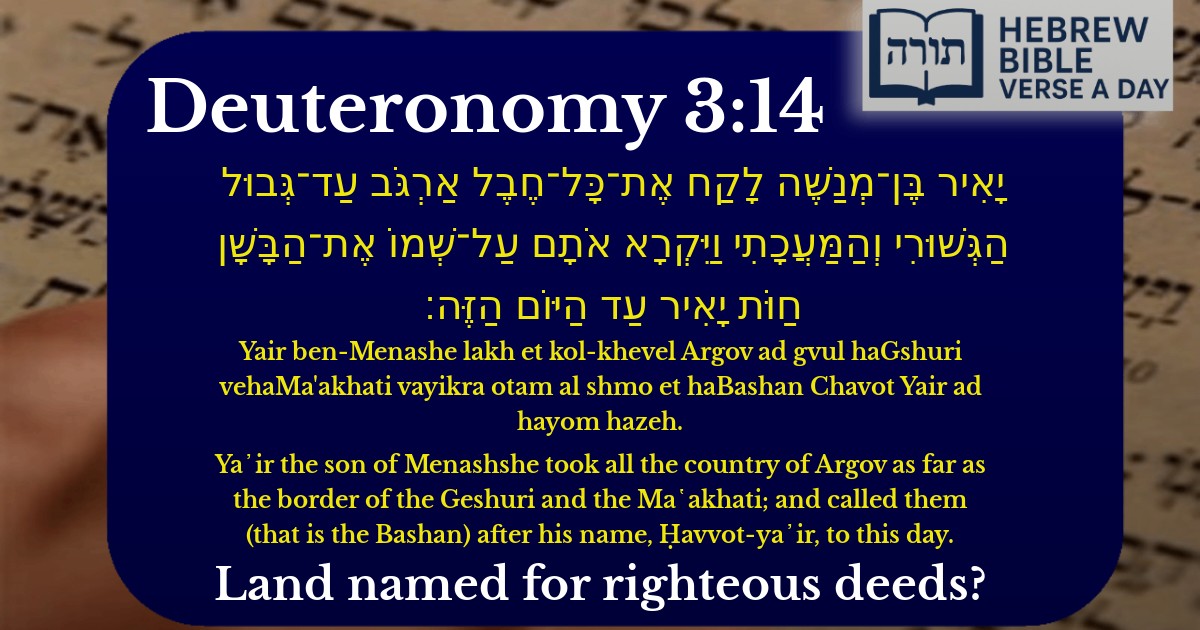Join Our Newsletter To Be Informed When New Videos Are Posted
Join the thousands of fellow Studends who rely on our videos to learn how to read the bible in Hebrew for free!
Hebrew Text
יָאִיר בֶּן־מְנַשֶּׁה לָקַח אֶת־כָּל־חֶבֶל אַרְגֹּב עַד־גְּבוּל הַגְּשׁוּרִי וְהַמַּעֲכָתִי וַיִּקְרָא אֹתָם עַל־שְׁמוֹ אֶת־הַבָּשָׁן חַוֺּת יָאִיר עַד הַיּוֹם הַזֶּה׃
English Translation
Ya᾽ir the son of Menashshe took all the country of Argov as far as the border of the Geshuri and the Ma῾akhati; and called them (that is the Bashan) after his name, Ḥavvot-ya᾽ir, to this day.
Transliteration
Yair ben-Menashe lakh et kol-khevel Argov ad gvul haGshuri vehaMa'akhati vayikra otam al shmo et haBashan Chavot Yair ad hayom hazeh.
Hebrew Leining Text
יָאִ֣יר בֶּן־מְנַשֶּׁ֗ה לָקַח֙ אֶת־כׇּל־חֶ֣בֶל אַרְגֹּ֔ב עַד־גְּב֥וּל הַגְּשׁוּרִ֖י וְהַמַּֽעֲכָתִ֑י וַיִּקְרָא֩ אֹתָ֨ם עַל־שְׁמ֤וֹ אֶת־הַבָּשָׁן֙ חַוֺּ֣ת יָאִ֔יר עַ֖ד הַיּ֥וֹם הַזֶּֽה׃
יָאִ֣יר בֶּן־מְנַשֶּׁ֗ה לָקַח֙ אֶת־כׇּל־חֶ֣בֶל אַרְגֹּ֔ב עַד־גְּב֥וּל הַגְּשׁוּרִ֖י וְהַמַּֽעֲכָתִ֑י וַיִּקְרָא֩ אֹתָ֨ם עַל־שְׁמ֤וֹ אֶת־הַבָּשָׁן֙ חַוֺּ֣ת יָאִ֔יר עַ֖ד הַיּ֥וֹם הַזֶּֽה׃
🎵 Listen to leining
Parasha Commentary
📚 Talmud Citations
This verse is not quoted in the Talmud.


Ya'ir ben Menashe's Conquest
The verse describes Ya'ir ben Menashe's conquest of the region of Argov in Bashan, extending to the borders of Geshuri and Ma'akhati. According to Rashi (Devarim 3:14), Ya'ir was a descendant of Menashe through his daughter, as the Torah later clarifies (Bamidbar 32:41) that he was from the tribe of Yehudah but inherited through Menashe due to the laws of yerushah (inheritance) through his maternal lineage. This demonstrates the complexity of tribal inheritance in Eretz Yisrael.
Naming the Region "Chavot Ya'ir"
Ya'ir renamed the conquered territory "Chavot Ya'ir" (the villages of Ya'ir). The Talmud (Bava Batra 121b) explains that the term "Chavot" refers to unwalled villages, distinguishing them from fortified cities. Ramban (Devarim 3:14) notes that this name persisted "until this day," indicating the lasting impact of Ya'ir's conquest and the Divine approval of his actions in securing land for Bnei Yisrael.
Historical and Geographical Context
Spiritual Significance
The Sforno (Devarim 3:14) highlights that Ya'ir's actions were not merely for personal glory but to establish a lasting Jewish presence in the land. By naming the villages after himself, he ensured that future generations would remember the fulfillment of Hashem's promise to give Eretz Yisrael to Bnei Yisrael. This aligns with the principle of yishuv Eretz Yisrael (settling the Land of Israel) as a mitzvah of great importance.